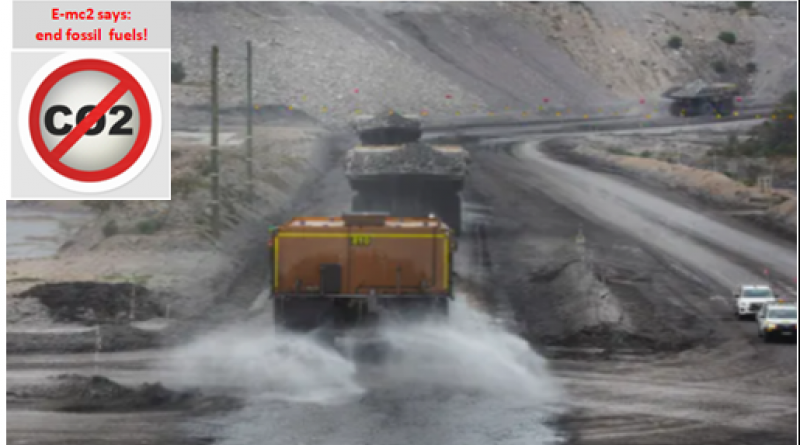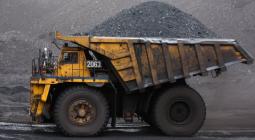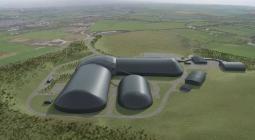How can NSW allow new coalmines while committing to net zero emissions? It’s bizarre.

New mines won’t boost world demand for Australian coal — but they will cannibalise jobs from existing coalmines.
The New South Wales government is simultaneously committed to a net-zero emissions target for 2050 at the same time as new coalmines in the Hunter Valley with the capacity to produce 10 times more coal than Adani’s Carmichael mine are being proposed by the industry. Welcome to the topsy turvy world of Australian climate policy.
Australia is the third-largest exporter of fossil fuels, behind only Saudi Arabia and Russia. But because of the way that international accounting rules for greenhouse gas emissions work, the emissions from burning the enormous amounts of coal and gas we export do not “count” towards Australia’s emissions. When Australia exports iron ore and coal to be turned into steel, cars and fridges that are sent back to Australia, it’s China that gets blamed for the emissions, not Australia. Cool, huh?
But accounting rules aside, whether or not Australia builds enormous new coalmines in the next few years will have enormous consequences for local communities, the shape of Australia’s economy and global greenhouse gas emissions. Again, Australia is already the world’s third-largest exporter of fossil fuels. If we build another 23 coalmines or mine extensions across NSW then we will either tank the world’s emission reduction goals or be left with stranded assets, ruined communities and a moonscape on which farming and tourism jobs will be impossible to create.
On Four Corners this week, the NSW energy and environment minister, Matt Kean, declared that: “The cheapest way to now deliver electricity or energy is a combination of wind, solar, pumped hydro and renewable technologies. So it’s not fossil fuels. It is now cleaner energy. Those people defending old technologies are the equivalent of defending Blockbuster in a Netflix world.” Kean is right, and of course the countries that we export our coal and our gas to know it too.
Why NSW would commit itself to phasing out fossil fuel use in the next 30 years yet assume that the rest of the world won’t do likewise, is just one of the simple questions that Australian governments and the coal industry will not answer. Luckily for them, most of the Australian media refuse to even ask such questions.
Former prime minister Malcolm Turnbull recently discovered the price of asking such simple questions when he was unceremoniously dumped by the NSW government from his role as chair of the Net Zero Emissions and Clean Economy board, for wondering aloud why new coalmines should be approved in the Upper Hunter when there is already enormous spare capacity in the region’s existing coalmines.
While supporting new coalmines has become the ultimate symbolic act of patriotism for Australian conservatives, the simple truth is new coalmines don’t boost world demand for our coal — they cannibalise jobs from existing coalmines. The biggest coalmines in the Hunter Valley are already running well below capacity, world demand for coal is flat and never lives up to the rosy forecasts made by the coal industry, and China has imposed trade restrictions on Australian imports. Building new coalmines anywhere in Australia will simply displace existing coal production and destroy jobs in existing mines, including in the Hunter Valley.
But when Turnbull told the ABC’s Fran Kelly that he supported a moratorium on building new coalmines until a comprehensive plan for the Hunter Valley could be developed, he was verballed by the coal industry and then sacked for the public response to words he never even uttered.
Labor’s Joel Fitzgibbon accused the former prime minister of wanting to make NSW a “coal mine free zone” and the Nationals’ Matt Canavan said that “stopping our coal going to poor countries is an inhumane policy to keep people in poverty.” Nothing unites the conservatives like their defence of coal.
But defending coal is unrelated to defending jobs. 99.5% of Australians do not work in coal mining and even in the seat of the Upper Hunter, 86% of the labour force doesn’t work in coal mining. Of course coal is a significant source of jobs, and of course if the mines were shut down tomorrow it would devastate those that work in them. But no one is suggesting such a shutdown. Significantly, despite all the sound and fury from the conservative commentariat, a recent poll of voters in the Upper Hunter commissioned by The Australia Institute found strong majority support for a moratorium on new coalmine approvals — including majority support among Nationals party voters and Shooters, Fishers and Farmers party voters.
People who live in coal communities know that a moratorium on building new coalmines protects existing coal jobs while helping the rest of the economy diversify. And while building new coalmines when existing ones are already under-utilised will hurt existing coal workers, the mere act of proposing new mines harms employment in other industries. No one is going to invest in a new hotel overlooking a valley that might one day have an enormous coalmine it. And nor will the winemakers, horse-breeders and farmers invest in their properties, if they fear their neighbour may soon be an enormous, dusty coalmine.
While the coal industry is clearly powerful enough to push Kean and the NSW government around, they are powerless to prevent the world switching to cheaper, cleaner and more convenient forms of energy than fossil fuels. The NSW government’s commitment to net-zero emissions by 2050 is to be applauded, but its simultaneous support for building enormous new coalmines is bizarre. It is not just the electricity grid that needs to diversify, it is the Australian economy as a whole. And while building new coalmines might not “count” towards Australia’s greenhouse gas emissions, the mere act of approving new coalmines will cruel the prospects for the Hunter to diversify its employment base.




